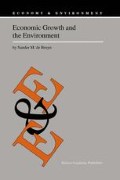Abstract
Consumption of materials and energy is an important interface between the economy and the environment. Analyses of the patterns, causes and effects of materials and energy consumption have therefore gained considerable interest in environmental economics. Dematerialisation is the term that describes the development where material use per unit of income (or a certain service) declines. Dematerialisation is important for sustainable development because (i) it relieves the scarcity constraints to economic development and therefore assures that exhaustion of natural resources can be postponed or prevented, and (ii) it causes pollution to decrease as every resource input sooner or later turns up as emission or waste due to the laws of thermodynamics. Historical investigations show that dematerialisation has indeed occurred over time, with respect to the various materials and energy in a range of developed countries (e.g. Larson et al.1986; Jänicke et al.1989) as well as with respect to individual products, such as automobiles (e.g. Herman et al1989; Eggert, 1990). Several studies have reported a large potential for future dematerialisation, such that materials and energy intensities in developed economies could be reduced by a factor four (von Weiszäcker et al1997). With growing environmental awareness, dematerialisation has apparently received considerable scientific and political interest.
Access this chapter
Tax calculation will be finalised at checkout
Purchases are for personal use only
Preview
Unable to display preview. Download preview PDF.
Author information
Authors and Affiliations
Rights and permissions
Copyright information
© 2000 Springer Science+Business Media Dordrecht
About this chapter
Cite this chapter
de Bruyn, S.M. (2000). Trends of dematerialisation and rematerialisation in aggregated throughput. In: Economic Growth and the Environment. Economy & Environment, vol 18. Springer, Dordrecht. https://doi.org/10.1007/978-94-011-4068-3_8
Download citation
DOI: https://doi.org/10.1007/978-94-011-4068-3_8
Publisher Name: Springer, Dordrecht
Print ISBN: 978-94-010-5789-9
Online ISBN: 978-94-011-4068-3
eBook Packages: Springer Book Archive

